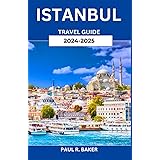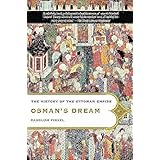The Ottoman-Russian Wars of the 18th Century: The History of the Conflicts that Strengthened Russia and Led to the Decline of the Ottoman Empire
by Charles River Editors | Dec 22, 2020
From Slaves to Prisoners of War: The Ottoman Empire, Russia, and International Law (The History and Theory of International Law)
Part of: The History and Theory of International Law (23 Books) | by Will Smiley | Nov 6, 2018
The Conquest of Turkey, Or, the Decline and Fall of the Ottoman Empire, 1877-8: A Complete History of the Late War Between Russia and Turkey, … Empires … Etc., Etc. : To Which Is Added Bi
by Linus Pierpont Brockett and Porter C. Bliss | Aug 22, 2015
Containing Balkan Nationalism: Imperial Russia and Ottoman Christians, 1856-1914 (Religion and Global Politics)
by Denis Vovchenko | Aug 15, 2016
Anatolia; or Russia triumphant and Europe chained: being an exposition of prophecy showing the inevitable fall of the French and Ottoman empires Volume 31
by John Thomas | May 26, 2018
Anatolia, Or, Russia Triumphant and Europe Chained: Being an Exposition of Prophecy, Showing the Inevitable Fall of the French and Ottoman Empires
by John Thomas | Apr 23, 2018
The conquest of Turkey;: Or, The decline and fall of the Ottoman empire. 1877-8. A complete history of the late war between Russia and Turkey, … of the leading actors in this great drama
by L. P Brockett | Jan 1, 1878
Osmanli Sarayinda Rusya / Russia in the Ottoman Palace
by n/a and Selmin Kangal | Jan 1, 2010
The History of the Negociations for the Peace Concluded at Belgrade September 18, 1739. Between the Emperor, Russia, and the Ottoman Porte, … Translated From the French of M. L’abbé Laugier
by Marc-Antoine Laugier | Apr 17, 2018
Observations on the Commerce of Great Britain With the Russian and Ottoman Empires and on the Projects of Russia Against the Ottoman and British Dominions
by W. B | Feb 7, 2018
The Conquest of Turkey; Or, The Decline and Fall of the Ottoman Empire. 1877-8. A Complete History of the Late War Between Russia and Turkey, … of the Two Empires … Etc., Etc. To
by Linus Pierpont Brockett | Sep 13, 2013
Papers Respecting Austria, Denmark, the Ottoman Porte, Portugal, Russia, and the United States; Presented to Parliament in 1808
by Great Britain Foreign Office | Feb 2, 2012
Russia, Poland and the Ottoman Empire, 1725-1800 (Access to History)
by andrina-stiles | Jan 1, 1900
Turks Across Empires: Marketing Muslim Identity in the Russian-Ottoman Borderlands, 1856-1914 (Oxford Studies in Modern European History)
Part of: Oxford Studies in Modern European History (18 Books) | by James H. Meyer | Jul 22, 2019
Turks Across Empires tells the story of the pan-Turkists, Muslim activists from Russia who gained international notoriety during the Young Turk era of Ottoman history. Yusuf Akcura, Ismail Gasprinskii and Ahmet Agaoglu are today remembered as the forefathers of Turkish nationalism, but in the decade preceding the First World War they were known among bureaucrats, journalists and government officials in Russia and Europe as dangerous Muslim radicals. This volume traces the lives and undertakings of the pan-Turkists in the Russian and Ottoman empires, examining the ways in which these
individuals formed a part of some of the most important developments to take place in the late imperial era.
James H. Meyer draws upon a vast array of sources, including personal letters, Russian and Ottoman state archival documents, and published materials to recapture the trans-imperial worlds of the pan-Turkists. Through his exploration of the lives of Akcura, Gasprinskii and Agaoglu, Meyer analyzes the bigger changes taking place in the imperial capitals of Istanbul and St. Petersburg, as well as on the ground in central Russia, Crimea and the Caucasus.
Turks Across Empires focuses especially upon three developments occurring in the final decades of empire: an explosion in human mobility across borders, the outbreak of a wave of revolutions in Russia and the Middle East, and the emergence of deeply politicized forms of religious and national identity. As these are also important characteristics of the post-Cold War era, argues Meyer, the events surrounding the pan-Turkists provide valuable lessons regarding the nature of present-day international and cross-cultural geopolitics.





















